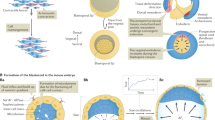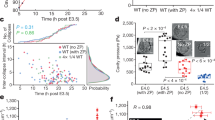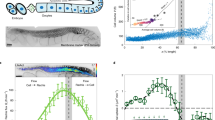Abstract
ELECTROPHYSIOLOGICAL experiments have shown the presence of electrical coupling between non-excitable cells in a number of embryonic systems and there is currently considerable interest in the significance of such coupling in relation to the control of growth and differentiation1. One approach described here which might prove useful in assessing the importance of low resistance junctions during development involves the treatment of such coupled cells with agents which will “uncouple” them, followed by careful observation of subsequent development.
This is a preview of subscription content, access via your institution
Access options
Subscribe to this journal
Receive 51 print issues and online access
$199.00 per year
only $3.90 per issue
Buy this article
- Purchase on Springer Link
- Instant access to full article PDF
Prices may be subject to local taxes which are calculated during checkout
Similar content being viewed by others
References
Furshpan, E. J., Current Topics in Developmental Biology, 3 (1968).
Loewenstein, W. R., Ann. NY Acad. Sci., 137, 441 (1966).
Hauswirth, O., J. Physiol., 201, 42P (1969).
Allison, A. C., and Nunn, J. F., Lancet, ii, 1326 (1968).
Author information
Authors and Affiliations
Rights and permissions
About this article
Cite this article
PALMER, J., SLACK, C. Effect of ‘Halothane’ on Electrical Coupling in Pregastrulation Embryos of Xenopus laevis. Nature 223, 1286–1287 (1969). https://doi.org/10.1038/2231286a0
Received:
Issue Date:
DOI: https://doi.org/10.1038/2231286a0
Comments
By submitting a comment you agree to abide by our Terms and Community Guidelines. If you find something abusive or that does not comply with our terms or guidelines please flag it as inappropriate.



